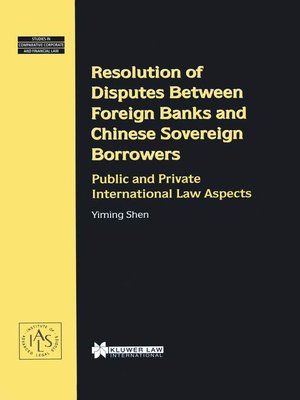Resolution of Disputes Between Foreign Banks and Chinese Sovereign Borrowers
ebook ∣ Public and Private international Law Aspects
By Yiming Shen

Sign up to save your library
With an OverDrive account, you can save your favorite libraries for at-a-glance information about availability. Find out more about OverDrive accounts.
Find this title in Libby, the library reading app by OverDrive.



Search for a digital library with this title
Title found at these libraries:
| Loading... |
In recent years the People's Republic of China has experienced rapid economic growth, brought about in large measure by dramatic increases in foreign trade and investment. China's adoption of an 'open door' policy in the late 1970s also opened up its banking market to foreigners. As a result, there has been a sharp rise in the number of disputes between Chinese sovereign borrowers and foreign banks, making the availability of appropriate dispute resolution mechanisms for foreign banks a critical factor in the expansion of international finance in China.
This book recognizes the need for a unique international dispute resolution forum that addresses intricate political and diplomatic considerations and issues of state sovereignty, issues that typically arise from disputes regarding state contracts between national governments and private foreign parties. The work addresses several problematic private and public international law i s m s in sovereign debt litigation, including the state immunity theory, the act of state doctrine, forum non conveniens, and the difficulty in enforcing foreign judgments. It offers a comprehensive survey of the many choices open to a foreign bank operator in planning a dispute resolution strategy in China, analyzing the strengths and weaknesses of each process, and examining a series of case studies by way of illustration.
The author argues that the autonomy of each party in international arbitration circumvents potential cultural and conceptual difficulties and offers a flexible, mutually acceptable means of conflict resolution which in some circumstances can prove more effective than litigation. Arbitration and the recognition and enforcement of an arbitral award may be recognized as providing a level playing field for international financial transactions between states and foreign private parties, and the non-adversarial nature of the arbitration process makes it particularly appropriate in the Chinese context.






